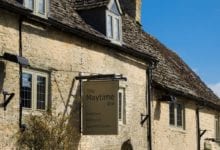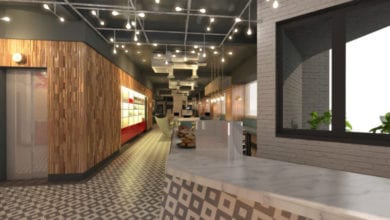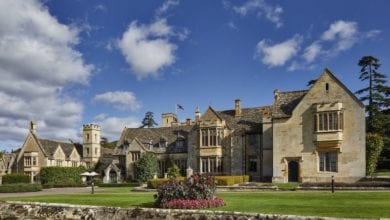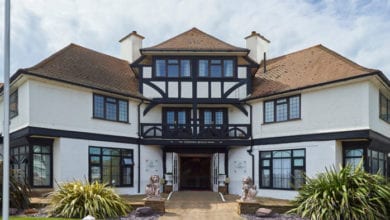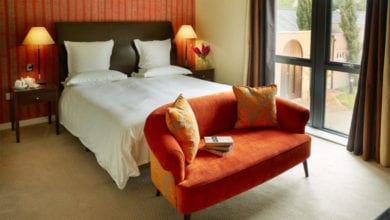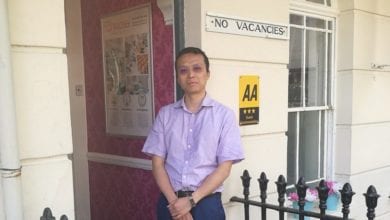Front of House: Hotel Maiyango
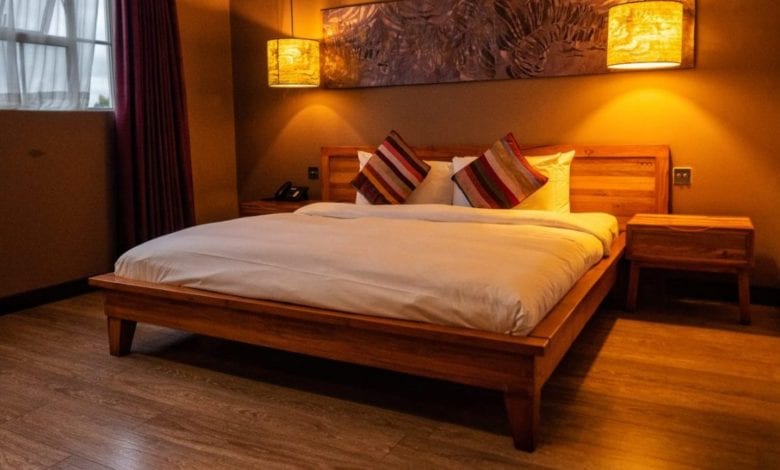
Could you tell us about your background and how you came to own Hotel Maiyango?
I created the brand at the ripe old age of 24 and thought it would be a good idea to take advantage of the gap in the market in Leicester, where there wasn’t a boutique hotel. I came up with this concept which is kind of cocktail and food-led.
The hotel opened in 2007, so we are going back to 2006 here and people really didn’t know what boutique hotels were in the Midlands. I had been to a couple of very good examples, and I just thought ‘well, maybe Leicester needs something like this’. It was a derelict building but it had massive potential.
It was mainly responding to an opportunity, but I was really extremely interested in doing more than just the restaurant business. Restaurants are really fun and interesting, but I found that there was something lacking for me. I think that the hotel brought that extra dimension to it.
So you hadn’t had any experience in the hospitality trade beforehand?
Nothing at all. I tried to always think how a guest would feel about this or that, and the whole premise of my angle was based on the customer experience. That was something that I could relate to, but at the same time I didn’t necessarily have the expertise of knowing how to run a hotel. But at the same time, I surrounded myself with good people which really helped.
The property was derelict when you first bought it – how did you transform it into what it is today?
I think the most novel thing about the hotel is you can walk in at ground level, there is a glass door that’s quite discreet, and you go in and take a lift up to the third floor. That third floor was the old roof of the building and it’s now where the reception and a 24-hour bar is. The floor also has a terrace that wraps around, and guests can look straight down the high street.
Last year the council completed what is now called Jubilee Square in front of us, it’s a huge open expanse right in front of the hotel and we’ve got arguably some of the best views in Leicester. Rather than just have the rooms up there, where one room would have benefitted from the view, it’s instead the main public space so anyone that comes up, whether it’s for an event, a drink, a function or to stay at the hotel, gets hit with an incredible view.
Quite frankly at ground level people might think, ‘this is a bit odd, it’s just a door, it’s unmanned and there is a lift’. I know speakeasies have come and gone, but I guess 10 years ago we were a speakeasy without really intending to be one.
Was it always your plan to build a hotel as an addition to the restaurant, or did that idea come later?
I think it came afterwards to be honest, I had seen a gap in the market and exploited it. I think what we created with the restaurant was so unique that it was great to take that brand and expand it. That was really what I was looking to do, to build a brand and see how far we could take it.
The hotel has 14 bedrooms, how are they designed and where do you draw your inspiration from?
Before I opened the restaurant I was in the coffee business, supplying hotels, bars and restaurants all across the UK. Before that I had done a lot of travelling, spending time in South America, Africa, Asia and Europe. I drew from these travelling experiences, and I wanted to create this welcoming hospitality experience, which lends itself really well to boutique hotels. It was always a premise that if we are luxury and we are boutique, then plentiful space is part of that.
So we wanted to have oversized rooms, nice floorspace and big furniture. We have these huge windows in some of the rooms that are over four metres in width and two metres high, it almost governs where your rooms are and we really used that to our advantage. Looking back, the market has moved on a bit with capsule hotels and maximising floor space. Perhaps someone else would come along and get far better yield, but that’s fine, the profile of what guests want also changes as well.
Do the bedrooms have a particular theme?
They’ve got a strong, Maiyango theme. The restaurant inspired the design of the hotel, though it was maybe a bit cleaner, crisper and more contemporary. We used dark and muted colours, a nice lighting scheme so things could be dimmed for that intimate experience and all of the furniture was bespoke and commissioned by us. It definitely has a signature feel to it, and there was a lot of attention to detail, for example all of the furniture has ‘HM’ engraved into it for Hotel Maiyango and even the lampshades and artwork were commissioned.
You offer various spaces for conferences and meetings, do you welcome a lot of business guests?
During the week we have a huge corporate following and loads of regular business, and what’s nice is that in a small hotel like this you really get to know them. They’ve got their favourite rooms, they’ve got their quirks, it is a home-away-from-home and I think it then becomes an inexperience. There is a large Holiday Inn very close to us and people will choose us because the experience is a bit different, and that’s what these smaller boutique hotel properties are all about. Arguably the chains have sometimes got better facilities, they’ve got a gym and a pool, but people stay with us because it’s not just a bed factory.
What other types of guest does the hotel attract?
During the week we have a good level of corporate business, anything from travelling sales executives or managing directors and slightly higher up. We do a lot of corporate hospitality for people both in the hotel and in the restaurant, anything from private dinners, informal business dinners and meetings. We also get a fair amount of high-end leisure. We will get people who are treating themselves within our locality but also further afield, coming for a night away for a birthday, an anniversary or to get away from the kids. We also do a lot of celebrations such as weddings and parties, which is a key part of our business. We have quite diverse revenue streams, but mainly it is the accommodation, restaurant and the function and events side.
You mentioned developments in the city, has tourism been boosted in Leicester by Richard III’s burial?
It’s phenomenal, it has transformed Leicester, which one could argue was a mid-tier regional city and many would think ‘why would you go there unless you need to go there on business’, or if you’re seeing family or if it’s a stop off to go further north or south, it’s almost too convenient for its own good.
Suddenly you’ve got a huge influx people coming in to see this dead king, and the city suddenly has the makings of a tourist trade. You’ve got the Tigers, who have always attracted a good following, so on match days and the European games, you notice the people coming into the city and their spend. We also have Leicester City FC who are now doing well in the Premier League, and that also helps.
I find it’s the people from Europe who are coming to see a Premier League game, they can’t go and see Arsenal play at home but they can get a ticket and see Leicester vs Arsenal, so they will fly in from all over to come and watch that, that brings lots of money into the city. We’ve also got the Rugby World Cup happening this month, with three or four games taking place in Leicester, these are all positive things for the city and also for us.
Your restaurant won the Taste of England Gold Award recently?
We picked the award up in May, which was absolutely phenomenal. We were up against some stiff competition, we didn’t go there thinking that we would win the award, so it was a really pleasant surprise when we did. It’s odd because the restaurant came before the hotel, so it’s always seen locally as an independent restaurant as opposed to a restaurant attached to a hotel, which I think is a positive thing.
The restaurant is our shop window, so when people are coming to book function and events, they are going to dine with us and see what we are all about before spending money with us, so we find that it’s a natural way of winning business. Someone will come into the restaurant, they will have dinner with us, they will then work out we have a hotel, they stay with us, they then have a function with us, so there is a nice little customer journey which is great for business.
You also have a cocktail bar and offer cocktail classes, what does this add to the business?
It’s a really interesting and fun part of the business. We have been doing cocktail classes for about eight years, we are probably one of the first in the area and maybe even on a larger scale. It’s a great way of engaging with your customers, it’s a good revenue stream, it’s fun and it helps the business to pull people in. Again, it’s a softer way into the business because if someone is coming in for a cocktail then it’s cheaper than dinner but you see couples, you see friends and you see corporate customers, it’s really lucrative but most importantly it’s great for the brand as well.
You’ve got great reviews on a number of OTAs, is that hard to maintain?
Yes I’d say so, but that’s the aim of the game is consistency and getting it right day-in and day-out. We get it wrong sometimes like everybody else and when we do we need to respond quickly to put it right. Sometimes, and I’m sure I’m not the first person to say this, the review systems can be a bit skewed because the longer you have been on there, there is more chance of you picking up negative reviews because you have been there for 10 or 12 years. You can’t control it so you just have to focus on the guest experience and hope that people enjoy it and they come back. I think they are doing that and that’s the most important thing for us really.
What does the future hold?
That’s an interesting question. I think that we’ve shown, maybe like some other businesses which have seen out the recession and grown and had good success, that there is some real value in what we’re doing. Now is the time when we are thinking how to exploit Maiyango and what we’ve built up and what is the journey to take us to five or 10 of these. I think that, 10 years in, clearly we would have made some mistakes and learnt some good lessons, but I think we are on to something here and what we need to do is have a really strong idea and a plan of how we can take it further, and that is what I am working on at the moment.
This feature first appeared in the September 2015 issue of Jewellery Focus


